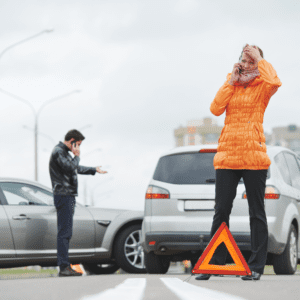Determining liability for bodily injury and property in a traffic accident (legal information)
How is responsibility for damage determined in the context of a car accident?
The rules regarding responsibility for causing damages in the context of a traffic accident in civil lawsuits are unique and complex: regarding bodily injuries in traffic accidents, the law establishes a rule of absolute responsibility of the offending driver. In contrast, regarding the issue of property damage, the degree of responsibility/guilt varies according to the circumstances of the case. In this article, an expert in tort law from our firm will elaborate on this complex issue.

Who is responsible for road accidents in Israel?
Road accidents in the State of Israel constitute a real scourge. The number of fatal road accidents in Israel is quite high and unfortunately has been on the rise in recent years (according to official reports and data). But aside from fatal accidents, it is important to remember that the number of road accidents involving bodily and property damage is much higher. We are all witnesses to the many dangers and accidents registered on Israel’s roads, which result from the irresponsible behavior of many drivers and problematic road conditions on a significant part of Israel’s roads. Naturally, this raises various questions regarding the imposition of responsibility in unfortunate cases where road accidents occur. In this regard, it is important to know that there is an important distinction between liability for bodily injury and liability for property damage in the context of road accidents, in light of different legal rules that apply in each case. Below we will explain this matter in detail.
What is the absolute liability rule for bodily injuries in a car accident?
The law in Israel regarding civil claims for traffic accidents (Road Accident Victims Compensation) establishes a rule of absolute responsibility of the driver who causes a traffic accident. The meaning of this rule is that regardless of the question of guilt, those injured in a car accident will be entitled to compensation. The condition for this compensation is that there is valid mandatory insurance covering the vehicle. This is a unique rule regarding car accidents since usually in tort claims it is required to prove responsibility for damages caused by the defendant. The reason why a different rule was chosen regarding bodily injuries in car accidents is the desire to prevent legal involvement in the issue of fault which may sometimes last for many years, during which, those who suffered bodily injuries will not be entitled to full compensation for the damages they suffered.
Based on the above, in cases of bodily injury caused by road accidents, the defendants are generally the insurance companies of the offending drivers. If the offending vehicle is not covered by mandatory insurance or in cases where the owner of the vehicle cannot be located (“hit and run accident“), the claim will be submitted to the compensation fund for road accident victims (Karnit). This fund was established to prevent cases where victims of road accidents will be forced to face a situation of helplessness in the face of a very difficult situation with no viable solution, in the sense that they will have no one to sue. To meet the standard of proof required in claims for bodily injury, it must be proven that all the following elements are met: (1) a bodily injury occurred as part of the traffic accident (that is, physical or mental damage was caused); (2) there is a causal connection between the traffic accident and the physical damage; (3) the accident was caused by a motor vehicle (according to the definition of a motor vehicle in the law); and (4) the use of the offending vehicle was intended for transportation purposes (that is, the accident did not occur as part of the use of the vehicle for purposes other than transportation).
As long as the above elements are met, it will be possible to apply the absolute liability rule, and as a result, the victims of the accident will be entitled to compensation regardless of the question of the responsibility of the offending drivers. In contrast to this, in the rarer cases in which the law does not apply, it will be necessary to prove the offending driver’s responsibility for the damage caused to the defendants. Such cases can exist, for example, when the injury was caused by a vehicle that does not meet the definition of a motor vehicle (such as an electric bicycle) or when it involves a motor vehicle, but the accident was not caused by the use of the vehicle for transportation purposes. But as mentioned, these cases are rarer and usually, it will be possible to claim compensation for road accidents directly from the insurance companies.
Liability for property damage in the context of a car accident is assessed according to the prevailing circumstances
Israeli law separates liability for bodily injury and liability for property damage in the context of a car accident. The rationale for this separation is, as we mentioned above, that the purpose of the absolute liability rule for bodily harm (including mental harm) is to provide compensation as quickly as possible to those injured in the traffic accident. The assumption is that receiving compensation for property damage does not have the same degree of urgency, and therefore, the unique provisions of the law do not apply to it. Accordingly, within the framework of property damage claims (also called Tin Damages), the claim will deal with the question of who is at fault or must assume responsibility for causing the damage.
The question regarding who will pay the compensation depends very much on the insurance coverage of the vehicle that both caused the accident and the injured vehicle. If the offending vehicle is insured with insurance to cover damages caused to other vehicles (“third party insurance”), it will be possible to sue the person driving the offending vehicle and the insurance company. In contrast, if the damaged vehicle is insured with comprehensive insurance, the owners of the damaged vehicle will be able to claim compensation directly from their insurance company. After that, the insurance company will file a claim against the insurance company or the owner of the offending vehicle, to cover the compensation they paid. These claims are known as subrogation claims. As part of these lawsuits, a discussion will be held on the question of the offending vehicle’s responsibility for the damages caused to the injured vehicle as part of the accident. The question of who will pay the compensation depends very much on the coverage; however, the claim to previously activate the insurance coverage under comprehensive insurance will not deal with liability for the accident.
What happens when the answer to the question of responsibility for property damage is ambiguous and not unequivocal?
It is important to note that things are not always so clear when it comes to liability for property damage, and the determination of liability is not always unambiguous. Not infrequently, liability claims may arise from both sides. This is common, for example, in cases of accidents that occurred when leaving a parking lot, during an overtaking on the road, or in accidents involving more than two vehicles (“chain accidents”). In all those cases where the question of responsibility is complex and all the involved parties claim to share responsibility, the court will have to decide on each issue. In a ruling given by the Supreme Court in 2018, the court emphasized to what extent the question of guilt will be decided according to the circumstances of the case, and that it may often be determined that a vehicle that was damaged in the accident also contributed to it to some extent. This contributory responsibility, called in the legal language as “contributory fault”, means that the percentages for the contribution to the liability of the injured vehicle will be deducted from the amount of compensation.
The ruling depends very much on the evidence submitted by the parties to the court as part of the lawsuit, including the version of the drivers provided as part of the accident report forms that are submitted to the insurance companies (as long as the vehicles are indeed insured), on the testimonies of eyewitnesses who were involved in the accident or witnessed its occurrence, as well as photographic documentation of the accident scene (as long as there is such documentation) and professional opinions. Hence the great importance of collecting evidence regarding the damage caused as close as possible to the occurrence of the accident, and for the representation of a lawyer specializing in tort law and traffic accidents as part of the claim.
For determining liability in a car accident contact our experts in tort law and car accidents
We have explained in detail in this article the issues of fault or tortuous liability, both for causing bodily harm and for causing property damage in the context of a car accident. For any additional questions or the need for advice and assistance in individual cases, you can contact our office and we will be happy to be at your service.
The lawyers in our office specialize in tort law and representation in claims for traffic accidents, in front of insurance companies, and all legal courts. You can contact us using the phone numbers or email addresses listed below, and arrange a consultation with an expert lawyer in the required field from our office, both in Jerusalem or Tel Aviv.
מאמרים מומלצים

